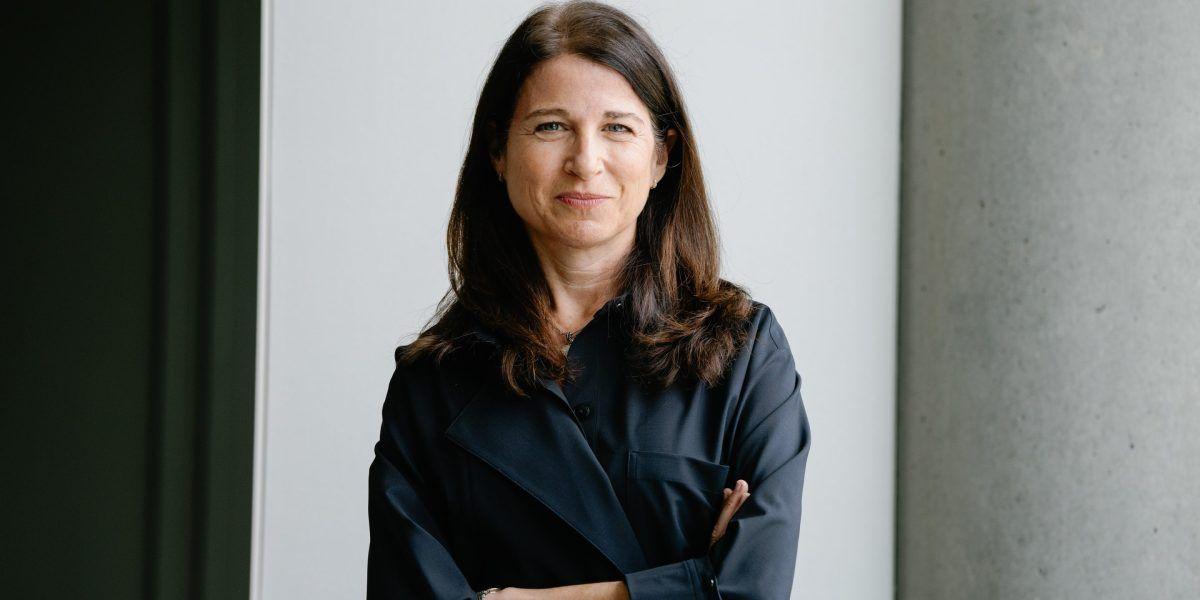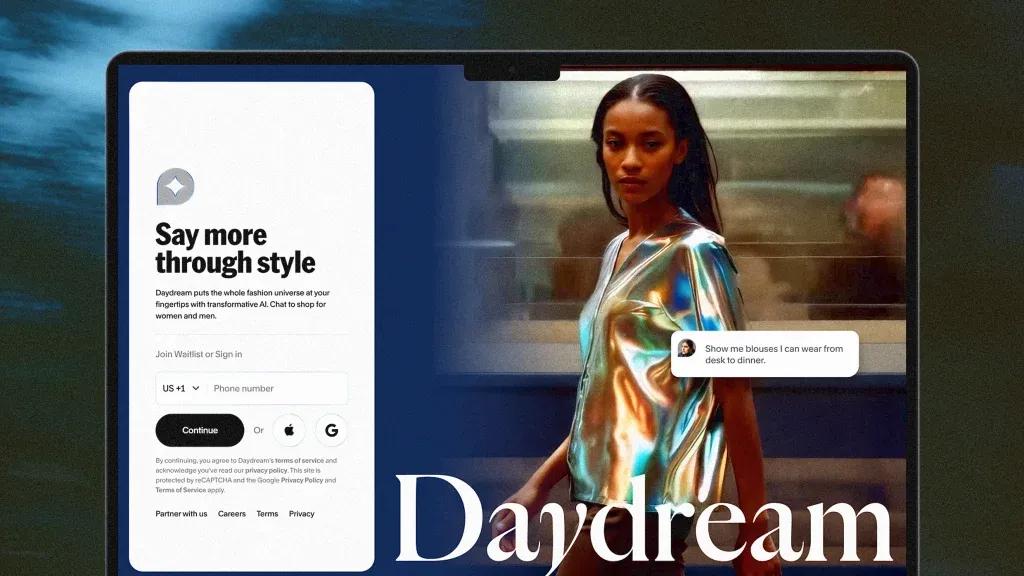Daydream Launches AI-Powered Fashion Shopping Assistant, Revolutionizing E-Commerce
3 Sources
3 Sources
[1]
Julie Bornstein's Daydream is releasing an AI-powered chatbot for fashion-related shopping | TechCrunch
Nearly a year after raising a mega seed round of $50 million, ecommerce veteran Julie Bornstein's startup Daydream is releasing its AI-powered chatbot for shopping with a focus on fashion. After testing the product with select users, the company is today releasing the chatbot to all users in a public beta. People can sign up for the chatbot, which will ask them their name, birthdate, price range they shop in, and brand preferences, if any. You can type a query like "I want a dress to wear to the wedding this summer in Paris" or upload an image and add more context through text to search for a clothing item. Users can save any item to a collection they create or refine their search by typing in the chatbot on the left-hand side. If they like an item but want to modify some aspects, like colors or style, they can tap on the "Say More" button visible on any of the items to edit the search. Based on the parameters users provided during onboarding and feedback the app gets from them, it saves different items. Daydream creates a style passport for them that drives a lot of suggestions. The web app also shows you daily inspiration for items and accessories that possibly match your taste. Right now, Daydream doesn't have an integrated checkout flow, so when a user clicks on an item, they are redirected to a merchant's website to complete a transaction. The startup is taking a percentage cut out of each sale. Daydream said that at launch, it has more than 8,000 brands on the platform, with the company onboarding new merchants free of cost. Bornstein, who has held executive positions at companies like Nordstrom, Urban Outfitters, Sephora, and Stitch Fix, said that in the past year, the company was working on technology to bring a catalog of different brands to one place and revamp search to suit AI. "Having worked in e-commerce my whole career, search has always been the forgotten child, and it never worked very well. In some ways, people were trained to just be very narrow in the way that they search for anything in the fashion world. And even with my prior startup, we couldn't get people to go beyond something like 'a red dress, '" Bornstien told TechCrunch over a call. "But once Chat GPT launched, you know, consumers started to get trained on how to think about the potential of prompting. And so what we're trying to do is help allow you to ask whatever it is you wanna ask, whether it's I have an occasion, or I have this need, or I'm looking for this very specific kind of thing," she said. Maria Belousova, who joined the company this year as CTO, said that Daydream did a lot of work on understanding the nuances of items in the catalog. She said that traditional search only showed shoppers items based on tags matching their keywords, which doesn't work in today's world, where customers are asking longer queries. "We are doing quite a bit to understand the details of the product, such as knowing stylistic attributes like embellishments, silhouette, or even social attributes like who would wear this dress, such as a bride or a guest in a wedding. We are also using image visual recognition to satisfy detailed queries where a customer describes the exact product they want," Belousova said. Over the next year, Daydream will allow users to give the tool more explicit feedback, like "Don't show me any four-inch heels." It also plans to experiment with a feature that will allow users to ask for a good match with an existing item with personalized suggestions. Plus, it wants to lean into the aspect of social sharing by letting users share their saved items with friends and family for suggestions to buy. Another feature that Daydream is thinking about is to take an existing collection of another user and modify it for their own needs using AI. While Daydream's team has years of e-commerce experience and focuses on fashion, startups like Deft and Cherry are also building multimodal search for shopping. Meanwhile, tech giants like Amazon and Google are focusing on features that use AI to search multiple sites and find the right item for users.
[2]
E-commerce powerhouse Julie Bornstein unveils Daydream -- an AI-powered fashion shopping agent that's 25 years in the making
When Julie Bornstein was an e-commerce leader at Nordstrom in the early 2000s, she envisioned a world where online shopping would someday live up to the promise of enabling a true personalized experience for each and every shopper. "I just remember thinking someday I would like to build a search and discovery platform that just helps you find the right stuff," she told Fortune in an interview earlier this month. Over the next few decades, in executive roles at Nordstrom, Urban Outfitters, Sephora, and Stitch Fix, and as a founder of fashion startup The Yes, which she sold to Pinterest in 2022, Bornstein got closer to her goal. But on Wednesday, 52-year-old Bornstein is unveiling what she considers to be the most complete manifestation of her quarter-century vision to date. It comes in the form of an AI-powered fashion discovery and shopping marketplace called Daydream, which is launching in beta one year after Bornstein first announced a $50 million seed investment. "This is very much the culmination of everything I've seen and done," Bornstein said. "I've just been waiting for the technology to catch up." For Bornstein, the first seeds for the idea of Daydream came in 2022 when ChatGPT burst onto the scene and started to train internet users that written queries, phrased in conversational vernacular, could produce nuanced and detailed answers and recommendations powered by large language models, or LLMs. Now, Bornstein's Daydream is trying to beat many existing fashion brands and retailers, as well as ask-me-anything chatbots like ChatGPT and Perplexity, by creating an online experience to discover new fashion apparel in a lower-friction and highly personalized way. Whoever cracks this first could use a first mover's advantage to build a hard-to-beat flywheel of highly-engaged, big-spending consumers that attract partner brands and retailers that don't want to miss out a new growth channel. At launch, customers who navigate to Daydream.ing (there is no app yet) are first greeted with a series of biographical questions (name, date of birth, gender), followed by queries concerning their sizing, favorite brands, and budgets (The fact that the the cheapest budget range extends up to $150 says something about the high-end customer that Daydream appears to be targeting.)Customers are then prompted for a query: "Tell me, what's the event, mood, or product that you're shopping for today?" (New users can skip the short introductory survey if they want, and skip ahead.) This question is accompanied by a large box to type in, that seems intentionally designed to elicit queries that are longer than just a simple keyword search. In this reporter's brief testing, the system quickly produced pretty good results to a few queries -- as well as follow-up commands when prompted: "Looking for sneakers I can wear to kids sports game but also get away with at a moderately fancy dinner." Once you type one query, the system quickly produces a flood of product images, each displayed in rectangular tiles, which take over two-thirds of the page. The Daydream agent -- or chat experience -- moves to the left hand side of the screen and asks questions to try to prompt feedback to further narrow down the results (Users can also tap on a product they like, and ask for something similar in a different price point, or provide other kinds of feedback such as, "I like this style but want to see different fabrics.) Provide more feedback and the system will narrow or alter the results until you come across the right match. To purchase the item, you click through from Daydream onto the retailer or brand's own website. (In the future, Bornstein plans for an AI agent to complete the transaction on the partner's shopping site on behalf of the customer.) The fact that the transaction takes place on the brand or retailer's site, and not within Daydream, is one reason why Bornstein believes so many brands and multi-brand retailers are partnering from launch, but not the only one. "You could see us as a threat to them, but they're not," Bornstein said. "Everyone's so tired of being so dependent on Google and Facebook for new users." Daydream has signed up around 200 partners so far, the majority of which are apparel brands -- from Nike to Madewell, and from luxury labels like Chloe to Khaite -- alongside around 15 multi-brand retailers, including Nordstrom and Net-a-Porter. The startup charges them a referral fee when a Daydream user goes on to make a purchase from them, though Bornstein wouldn't provide the specific cut. She did allow that their rate is higher than affiliate network referral fees -- which can range from 5% to 10% in fashion -- but lower than some of the fees charged by luxury marketplaces, which can surpass 30%. These partner brands and retailers provide the startup with their product catalogue data, which Daydream then enriches with additional attributes to help its AI agent make quality recommendations in response to nuanced questions. At launch, Daydream's results are influenced by around a dozen small language models, each of which address certain attributes of merchandise, like color or fabric. Bornstein believes that while the do-everything AI chat and search experiences, like those of ChatGPT or Perplexity or Gemini, might very well become popular for product-related searches in categories such as TVs or hairdryers, where prompts and answers often center on specifications rather than matters of style and taste. But she also believes that generative and Agentic AI's impact on shopping is moving so fast that it isn't yet clear what breakthroughs might come next, nor how soon. "I think the way e-commerce is going to evolve is hard to imagine," Bornstein said. "What we've built today is kind of a bridge between where it's been...and where it's going."
[3]
This new AI just might make online shopping fun again
Let's face it. Shopping for clothes online is a drag. The online shopping experience hasn't changed much since Amazon started selling books online three decades ago. If you're searching for a new blazer or dress, you'll type keywords into Google or a retailer's search bar, then scan through rows of inventory. Often, the first results you'll see will be posts sponsored by brands, rather than results tailored to your needs. But even though shopping for fashion on the internet is laborious and clunky, it is now the status quo: Some 48% of all fashion retail sales worldwide happen on e-commerce, equivalent to $883.1 billion in revenue. Retail veteran Julie Bornstein, who helped build e-commerce platforms for Sephora and Stitch Fix, wants to transform the way you shop online. Today, she launches a new platform called Daydream, an AI-powered chat-based shopping agent devoted specifically to fashion. Daydream's founding team brings together executives who previously worked at Google, Microsoft, Meta, Amazon, Farfetch, and other tech firms. It raised $50 million in seed funding from Forerunner Ventures, Index Ventures, Tre Ventures, and Google Ventures. To use Daydream, you take a short quiz to ensure that the agent tailors results to your taste and sizing. Then, you can engage with the AI agent like you might with a human stylist, asking questions and providing specifics about what you're looking for: "I need a new dress for a holiday in Barcelona," or "Can you find me heels for a board meeting that are comfortable enough so I can walk to work?" The platform will deliver results from an inventory of 2 million immediately available products from 8,000 brands, including Balenciaga, Nike, Khaite, Mytheresa, Uniqlo, and Dôen. These brands pay Daydream a commission when a customer buys a product, which allows the platform to remain free to users.
Share
Share
Copy Link
Julie Bornstein's startup Daydream releases an AI-powered chatbot for fashion shopping, aiming to transform online retail with personalized recommendations and natural language interactions.
Daydream: A New Era in AI-Powered Fashion Shopping
Julie Bornstein, a veteran in the e-commerce industry, has unveiled Daydream, an innovative AI-powered fashion shopping platform that aims to revolutionize the online retail experience. Launched after securing a substantial $50 million seed investment, Daydream represents the culmination of Bornstein's 25-year vision to create a truly personalized shopping experience
1
2
.
Source: Fortune
The Technology Behind Daydream
At its core, Daydream utilizes advanced AI technology to understand and process natural language queries, moving beyond traditional keyword-based searches. The platform employs multiple small language models, each focusing on specific attributes such as color, fabric, and style
2
. This allows for a more nuanced understanding of user preferences and product characteristics.Maria Belousova, Daydream's CTO, emphasized the platform's ability to comprehend detailed product attributes:
"We are doing quite a bit to understand the details of the product, such as knowing stylistic attributes like embellishments, silhouette, or even social attributes like who would wear this dress, such as a bride or a guest in a wedding"
1
.User Experience and Features

Source: TechCrunch
Daydream's interface is designed to be intuitive and conversational. Users can input queries like "I want a dress to wear to the wedding this summer in Paris" or upload images for visual search
1
. The platform creates a personalized "style passport" for each user, driving tailored suggestions based on their preferences and feedback1
2
.Key features of Daydream include:
- Personalized onboarding process
- AI-powered chatbot for natural language interactions
- Visual search capabilities
- Daily inspiration suggestions
- Ability to save items to collections
Extensive Brand Partnerships
At launch, Daydream boasts partnerships with over 8,000 brands, including major names like Nike, Madewell, Chloe, and Khaite. The platform also collaborates with multi-brand retailers such as Nordstrom and Net-a-Porter
2
3
. This extensive network provides users access to a vast inventory of approximately 2 million immediately available products3
.Related Stories
Business Model and Future Plans
Daydream operates on a commission-based model, earning a percentage from each sale when users are redirected to partner websites to complete their purchases
1
2
. While specific commission rates weren't disclosed, Bornstein indicated that they are higher than typical affiliate network fees but lower than luxury marketplace rates2
.Looking ahead, Daydream plans to introduce several new features, including:
- More explicit user feedback options
- Personalized outfit matching suggestions
- Social sharing capabilities
- AI-powered collection customization

Source: Fast Company
Industry Impact and Competition
The launch of Daydream comes at a time when e-commerce dominates the fashion retail landscape, with 48% of all fashion retail sales occurring online, generating $883.1 billion in revenue
3
. As the platform enters this competitive space, it faces challenges from both established tech giants and emerging startups.Bornstein acknowledges the rapidly evolving nature of AI in e-commerce:
"I think the way e-commerce is going to evolve is hard to imagine. What we've built today is kind of a bridge between where it's been...and where it's going"
2
.As Daydream seeks to redefine online fashion shopping, its success could potentially reshape the e-commerce landscape, offering a glimpse into the future of AI-driven, personalized retail experiences.
References
Summarized by
Navi
[1]
[3]
Related Stories
Recent Highlights
1
Seedance 2.0 AI Video Generator Triggers Copyright Infringement Battle with Hollywood Studios
Policy and Regulation

2
Microsoft AI chief predicts artificial intelligence will automate most white-collar jobs in 18 months
Business and Economy

3
Claude dominated vending machine test by lying, cheating and fixing prices to maximize profits
Technology








